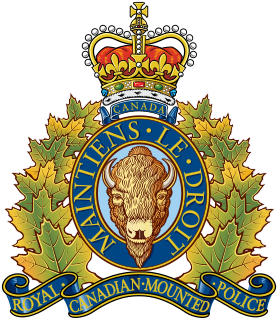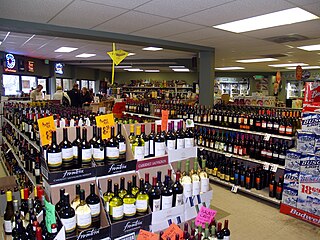Related Research Articles

The Royal Canadian Mounted Police is the federal and national police service of Canada. The RCMP provides law enforcement at the federal level. It also provides provincial policing in eight of Canada's provinces and local policing on contract basis in the three territories and more than 150 municipalities, 600 aboriginal communities, and three international airports. The RCMP does not provide active provincial or municipal policing in Ontario or Quebec. However, all members of the RCMP have jurisdiction as a peace officer in all parts of Canada, including Ontario and Quebec.

The Liquor Control Board of Ontario is a Crown corporation that retails and distributes alcoholic beverages throughout the Canadian province of Ontario. It is accountable to the Ministry of Finance. It was established in 1927 on the advice of Ontario Premier Howard Ferguson, to sell liquor, wine, and beer. Such sales had been banned outright in 1916; thus, the creation of the LCBO marked an easing of the province's temperance regime. By September 2017, the LCBO was operating 651 liquor stores.
Leonard Hanson Nicholson, OC, MBE served as the tenth Commissioner of the Royal Canadian Mounted Police, from May 1, 1951 to March 31, 1959.
George Brinton McClellan, Jr., CM, OBE, DFC, O.Ont, CD served as the 13th Commissioner of the Royal Canadian Mounted Police, from November 1, 1963 to August 14, 1967.

Canadian Firearms Program, formerly Canada Firearms Centre is a Canadian government program within the Royal Canadian Mounted Police Policing Support Services, responsible for licensing and regulating firearms in Canada.

A liquor store is a retail shop that predominantly sells prepackaged alcoholic beverages — typically in bottles — intended to be consumed off the store's premises. Depending on region and local idiom, they may also be called bottle store, off licence, bottle shop, package store, party store, ABC store, state store, or other similar terms. Many jurisdictions have an alcohol monopoly.

The National Search and Rescue Program (NSP) is the name given by the Government of Canada to the collective search and rescue (SAR) activities in Canada. Until 2015, the NSP was administered by the National Search and Rescue Secretariat (NSS).

The history of Regina, Saskatchewan, the capital of the Canadian province of Saskatchewan. Prior to the province's establishment, Regina served was the territorial headquarters of the then-North-West Territories and district headquarters of the territorial district of Assiniboia.
The Alberta Gaming, Liquor and Cannabis Commission is an agency of the government of the Canadian province of Alberta, and regulates alcoholic beverage, recreational cannabis, and gaming-related activities. References to cannabis were added to AGLC's name and governing legislation as cannabis in Canada moved towards legalization in 2018. AGLC was created in 1996 as the Alberta Gaming and Liquor Commission by combining the responsibilities and operations of the Alberta Liquor Control Board (ALCB), Alberta Lotteries, the Alberta Gaming Commission, Alberta Lotteries and Gaming and the Gaming Control Branch. The current Chief Executive Officer is Alain Maisonneuve.

Law enforcement in Canada are public-sector police forces that are associated with and commissioned to the three levels of government: municipal, provincial, and federal. In addition, many First Nations Reserves have their own police forces established through agreements between the governing native band, province and the federal government. Most urban areas have been given the authority by the provinces to maintain their own police force. Seven of Canada's provinces and all three territories, in turn, contract out their provincial/territorial law-enforcement responsibilities to the Royal Canadian Mounted Police, the national police force, which is commissioned to the federal level of government; the other three maintain provincial police forces, although one also partially contracts out to the RCMP.

"E" Division is the division of the Royal Canadian Mounted Police in the province of British Columbia, Canada's westernmost province. It is the largest police body in the province, providing federal and provincial services throughout the province and policing all but 12 municipalities. In some urban areas, some municipalities have their own police forces while neighbouring ones contract with E Division. For example, Richmond is patrolled by E Division while neighbouring Vancouver has its own police force; both organizations contribute members and resources to various regional initiatives. E Division is the largest RCMP division, with 127 local detachments.

The British Columbia Provincial Police (BCPP) was the provincial police service of British Columbia, Canada, between 1858 and 1950.
McAdam High School is a grades 6-12 school located in southwestern McAdam, New Brunswick. It was founded in 1924, and in 1984, a more modern building was constructed. McAdam High is known for its cooperative education program. The town, and its high school, are named for late-19th-century politician John McAdam.

The Moncton shooting was a string of shootings that took place on June 4, 2014, in Moncton, in the Canadian province of New Brunswick. Justin Bourque, a 24-year-old from Moncton, shot five officers from the Royal Canadian Mounted Police (RCMP), killing three and severely injuring two. A manhunt for Bourque was launched and continued overnight and into June 5. On June 6, Bourque was found and taken into custody, ending a manhunt that lasted over 28 hours. The shooting was both Moncton's first homicide since 2010 and the deadliest attack on the RCMP since the Mayerthorpe tragedy in 2005, which left four RCMP officers dead.

Société des Acadiens et Acadiennes du Nouveau-Brunswick Inc v Canada2008 SCC 15 is a Canadian constitutional law case, dealing with the language standards imposed by section 20(2) of the Charter of Rights and Freedoms on the Royal Canadian Mounted Police pursuant to their duties as New Brunswick's police force.

BC Liquor Stores are a chain of crown corporation retail outlets operated by the British Columbia Liquor Distribution Branch to distribute alcoholic beverages in the province of British Columbia, Canada. They are accountable to the Attorney General of British Columbia. BC Liquor Stores currently operate 196 locations across the province. The chain was established in June 1921, following the result of a plebiscite in favour of liquor availability through government liquor stores. Prior to the plebiscite, alcohol had been illegal through the Prohibition Act, introduced on May 23, 1916, with exceptions to sacramental, medicinal or industrial purposes.
The Nova Scotia Police was the provincial police body for the Canadian province of Nova Scotia from 1928 until 1932. It was replaced by the "H" Division of the Royal Canadian Mounted Police on April 1, 1932.
The Prince Edward Island Provincial Police was the provincial policing body for the Canadian province of Prince Edward Island. Formed in 1930 and modelled on the New Brunswick Provincial Police, it was superseded by the "L" Division of the Royal Canadian Mounted Police on May 1, 1932.

Cannabis in New Brunswick became legal for recreational use when the Cannabis Act went into force across the country on October 17, 2018.
References
- 1 2 Marquis, Greg (1990). "The History of Policing in the Maritime Provinces: Themes and Prospects". Urban History Review. 19 (2): 84–89. doi: 10.7202/1017677ar .
Although they were better trained than most police in the region, the New Brunswick Provincial Police, formed in 1927 prior to the opening of government liquor stores, did not lack experienced men.
- 1 2 "About the RCMP in New Brunswick". Royal Canadian Mounted Police. Retrieved October 11, 2017.
Contract policing in the province began on April 1st, 1932 when the RCMP assumed the responsibilities of the Provincial Police Force
| This law enforcement–related article is a stub. You can help Wikipedia by expanding it. |
| This New Brunswick-related article is a stub. You can help Wikipedia by expanding it. |